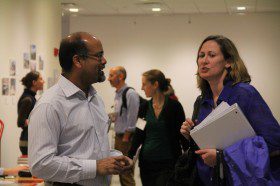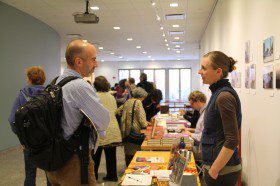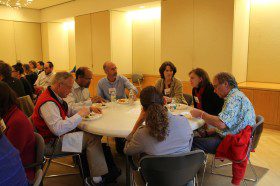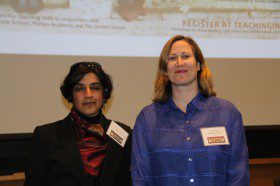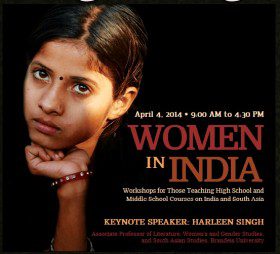 On April 4, 2014, the Educators for Teaching India (EFTI) will host a conference at Harvard to bring together high school and middle school educators who are interested in teaching courses about India and South Asia. The theme for the sixth annual conference is ‘Women in India: Negotiating Tradition and Modernity.’ SAI is proud to host the event at Harvard, in partnership with EFTI, The Winsor School, Phillips Academy and The Groton School. Tarun Khanna, Jorge Paulo Lemann Professor, Harvard Business School and Director of the South Asia Institute will give closing remarks. This year’s conference is on Friday, April 4, from 9:00am to 4:30pm in CGIS South, 1730 Cambridge Street, Cambridge MA.
On April 4, 2014, the Educators for Teaching India (EFTI) will host a conference at Harvard to bring together high school and middle school educators who are interested in teaching courses about India and South Asia. The theme for the sixth annual conference is ‘Women in India: Negotiating Tradition and Modernity.’ SAI is proud to host the event at Harvard, in partnership with EFTI, The Winsor School, Phillips Academy and The Groton School. Tarun Khanna, Jorge Paulo Lemann Professor, Harvard Business School and Director of the South Asia Institute will give closing remarks. This year’s conference is on Friday, April 4, from 9:00am to 4:30pm in CGIS South, 1730 Cambridge Street, Cambridge MA.
Established in 2008, EFTI is a group of secondary school educators dedicated to deepening knowledge of India and to exploring India’s role in school curricula. The organization includes teachers in public and private schools as well as educators in supporting academic institutions. Through outreach and education, EFTI aims to enhance the role that India plays in curriculum.
Learn more about EFTI and how to register: http://www.teachingindia.org/
Past participants explain the impact of EFTI conferences:
“I have been attending the EFTI conferences from the start and can say that it is the most rewarding professional development experience on my calendar. The conference always strikes a great balance between learning new things about India on the one hand, and developing pedagogy and classroom practice on the other. Sharing ideas with like-minded teachers has made my teaching of India far more sophisticated and dynamic. The “idea” of India is so well served by this conference that I come back every year.”
Brian Didier, Head, History Department; Director, Global Studies, The Winsor School
“The Educators for Teaching India conference is the most exciting conference for in-depth learning and networking that I have attended. I have met the most intelligent, thoughtful, and engaging educators there year after year. The keynote and the workshops are interactive and rigorous and the Indian lunch buffet is fantastic. I always leave the conference with renewed enthusiasm for my curriculum, new professional contacts, and pride in the teaching profession.”
Kristen Hayward Strobel, History Teacher, Lexington High School
“EFTI gave me the confidence and support to plan and teach an advanced history elective on modern India. Like so many world history teachers, I am often asked to teach outside my field of training and an advanced seminar elective sounded like a real challenge. I was reading on my own when I found out about the EFTI conference and realized that it was created for folks like me who were teaching themselves and needed confirmation that they were understanding the big picture, advice on classroom best practices and a connection to recent scholarship. EFTI gave all that as well as a supportive community of teachers of history and literature who were as committed as I was to ‘getting it right.’ “
Dr. Amy Enright, Instructor, History, Rivers School
“EFTI was founded by teachers in 2008 on the belief that a growing number of educators are interested in learning about India. We agreed that our to approach our teaching India requires a level of pedagogical and curricular innovation. Over the past 6 years, we have organized conferences that offer unique opportunities for educators to engage in complex topics such as caste, Gandhi, religion and democracy. Workshops are lead by university professors and high school teachers, resources are shared, and teachers connect with others who have similar interests. We look forward to this year’s conference focused on gender, and we have an outstanding group of presenters ready to share their diverse perspectives.”
Raj Mundra, Dean and Instructor, Biology, Phillips Academy, Founder, EFTI
Take a look at this year’s workshops:
Woman and Leadership, Then and Now
Harleen Singh, Associate Professor of Literature, Women’s and Gender Studies, and South Asian Studies, Brandeis University
Thomas Lamont, Head of History Department, Groton School
This workshop will focus on the lives and impact of three Indian women who played crucial roles during different eras of modern Indian history; Lakshmi Bai (the Rani of Jhansi), who fought the British during the Uprising of 1857; Indira Gandhi, who was Prime Minister of India during the 1960s, 70s, and 80s; and Mayawati, who was recently the Chief Minister of Uttar Pradesh, India’s most populous state. How these women gained power, wielded it, and lost it reveals insights into the role of gender and patriarchy in Indian society at different times in history.
The “Missing” Girls of India
Corinna Moucheraud, doctoral candidate at the Harvard School of Public Health, SAI Graduate Student Associate
Brian Didier, Head of the History Department and Director of Global Studies at the Winsor School
The aim of this workshop is to explore the phenomena of female feticide and infanticide in India. A recent U.N. study has argued that India is “the most dangerous place in the world to be born a girl,” and it is estimated that over 12 million girls have “gone missing” in India over the past few decades. The rise of sex-selective abortions has combined with the more traditional killing and neglect of young girls to produce a human rights tragedy that deserves more attention. In this workshop we will explore why young girls are treated so poorly and how such distorted birth ratios (there are regions where fewer than 800 girls are born for every 1,000 boys) are impacting Indian society. We will also consider how the study of female infanticide can be used in the classroom. Our workshop will include the participation of senior Winsor girls who have conducted research on the subject of girls in India.
Peer Pressure on Street Children and Related Gender Violence
Litcy Kurisinkal
Sameera Anwar, Primary Source
Children living on the streets in India are often perceived as delinquents in society. In the last couple of years, debates on juvenile justice and gender violence have become more widespread as the recent case on sexual assault in New Delhi involved a juvenile offender from the streets. While the crimes committed by juvenile ‘delinquents’ are crimes nonetheless, it is necessary to understand the dynamics around gender violence through the eyes of a street child to begin understanding the reasons that might lead to such gender assaults. Using case studies and documentaries, this workshop will introduce educators to the world of street children and their emotional landscape. Educators will gain a deeper insight into gender violence through the eyes of children living on the streets and examine ways to effectively address the root causes behind such violence.
Women’s Rights and Gender Based Violence: The Influence of the Education System
Antara Lahiri, Harvard Kennedy School
Amy Enright, Rivers School
The workshop discussion will center around gender violence in India and the role that can be played by schools in changing this dynamic. The violent December 2012 gang rape case in New Delhi will be used as an anchor to understand the dynamics of protest and empowerment in Indian society today. The different responses to the gang rape case will be highlighted. The position of women in India today and the cultural and societal assumptions that underlie this position will be discussed.
Doting Wives and Ferocious Mothers: The Divine Feminine and Her Power in Hinduism
Deonnie Moodie
Indu Chugani, Milton Academy
Kristin Strobel, Lexington High School
Simultaneously depicted as a fierce, bloodthirsty goddess, and as a kind, loving mother, Kali provides a provocative window into the nature of the divine feminine in Hinduism. In this workshop, we situate Kali, and the worship of goddesses more broadly, within other forms of Hinduism, looking at the ways in which gendered notions of the divine in this tradition have developed over time. Comparing iconography of goddesses who are depicted as wives (ex: Sita and Parvati) to goddesses who are depicted as single or without their husbands (ex: Durga and Kali), we see very different ideals of womanhood presented: from the the doting wife and mother who loves unquestioningly, to the vengeful wielder of raw, unbridled power. Examining two short poems dedicated to Kali, we see that sometimes those seemingly opposing ideals are presented in depictions of the one goddess. Together, we will unpack the complexities of the forms of power that are encapsulated in these representations of goddesses in Hinduism. At the end of the session, we will ask the question: Is the goddess a feminist?
This workshop is appropriate for all teachers, but is specifically aimed toward those who are interested in teaching about Hindu gods and goddesses, and incorporating iconography and primary texts in the study of Hinduism.
Goddesses, Poets, and Activists: Female Agency and Identity in Hinduism
Andrew Housiaux, Teacher of Ethics and Religion, Trinity School (NY)
This presentation will have three major topics pertaining to women in Hinduism. It will begin with an overview of Hindu art and iconography, with special attention to goddesses. What do the differences between Sita, faithful and obedient, and Kali, wrathful and powerful, tell us about idealized visions of the feminine within Hinduism? Next, we will consider the great 16th Century poet-saint Mirabai, situating her life in the context of the devotional movement known as bhakti. Finally, we will look at contemporary feminism within Hinduism, focusing especially on Meena Kandasamy, a Dalit poet-activist from South India.
This workshop presumes no prior knowledge of or background in the study of Hinduism. Some time at the beginning of the presentation will be devoted to helping to orient participants to this multi-vocal and complex religion.
Closing Remarks
Tarun Khanna, Jorge Paulo Lemann Professor at the Harvard Business School and Director of the South Asia Institute, Harvard University
While women in India continue to face struggles due to societal pressures and inequality in gender rights, as highlighted in the Women in India: Negotiating Tradition and Modernity workshops, there are those who have reached enormous success in the areas of business and entrepreneurship on a national and global scale. In closing, this session will elaborate on the changing role of Indian women who have overcome negative assumptions and empowered themselves and others.
Learn more about EFTI: http://www.teachingindia.org/

